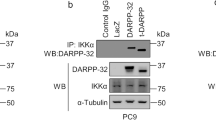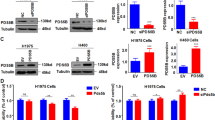Abstract
Mammalian STE20-like kinase 1 (Mst1) ubiquitously encodes serine threonine kinase, which is a 59-kDa class II GC kinase that shares 76% identity in amino-acid sequence with MST2, and is the closest mammalian homolog of Drosophila Hippo protein kinase, a major inhibitor of cell proliferation in Drosophila. Recent studies have shown that Mst1 and Mst2 perform tumor-suppressor function in a redundant manner and were originally identified as pro-apoptotic cytoplasmic kinases important for controlling cell growth, proliferation, apoptosis and organ size. We used recombinant eukaryotic expression vector containing human wild-type Mst1 gene to transfect human non-small cell lung cancer (NSCLC) A549 cells in vitro and in vivo. The results showed that Mst1 overexpression inhibited cell proliferation and induced apoptosis of A549 cells, promoted Yes-associated protein (YAP) (Ser127) phosphorylation and downregulated the transcriptional level of Cystein-rich protein connective tissue growth factor (CTGF), amphiregulin (AREG) and Survivin. In human NSCLC-cell-A549-xenograft models, Mst1 gene or cisplatin alone suppressed the growth of tumors and increased the cytoplasm-positive expression levels of YAP and Phospho-YAP (Ser127) proteins; however, their combination had the strongest anticancer effects. Overall, Mst1 has an important role in inhibiting the growth of NSCLC in vitro and in vivo; its antiproliferative effect is associated with induction of apoptosis through promotion of the cytoplasmic localization and phosphorylation of YAP protein at Ser127 site, indicating that Mst1 may be developed as a promising therapeutic target for NSCLC.
This is a preview of subscription content, access via your institution
Access options
Subscribe to this journal
Receive 12 print issues and online access
$259.00 per year
only $21.58 per issue
Buy this article
- Purchase on Springer Link
- Instant access to full article PDF
Prices may be subject to local taxes which are calculated during checkout







Similar content being viewed by others
References
Jemal A, Bray F, Center MM, Ferlay J, Ward E, Forman D . Global cancer statistics. CA Cancer J Clin 2011; 61: 69–90.
Smith RA, Cokkinides V, Brawley OW . Cancer screening in the United States, 2009: a review of current American Cancer Society guidelines and issues in cancer screening. CA Cancer J Clin 2009; 59: 27–41.
Travis WD, Colby TV, Corrin B, Shumosato Y, Brambilla E . Histological Typing of Lungand Pleural Tumors 3rd edn. Springer-Verlag: Berlin, 1999: p 547.
Chan DC, Earle KA, Zhao TL, Helfrich B, Zeng C, Baron A et al. Exisulind in combination with docetaxel inhibits growth and metastasis of human lung cancer and prolongs survival in athymic nude rats with orthotopic lung tumors. Clin Cancer Res 2002; 8: 904–912.
Poulsen TT, Pedersen N, Poulsen HS . Replacement and suicide gene therapy for targeted treatment of lung cancer. Clin Lung Cancer 2005; 6: 227–236.
Alamgeer M, Ganju V, Neil Watkins D . Novel therapeutic targets in non-small cell lung cancer. Curr Opin Pharmacol 2013; 13: 394–401.
West L, Vidwans SJ, Campbell NP, Shrager J, Simon GR, Bueno R et al. A novel classification of lung cancer into molecular subtypes. PLoS One 2012; 7: e31906.
Ling P, Lu TJ, Yuan CJ, Lai MD . Biosignaling of mammalian Ste20-related kinases. Cell Signal 2008; 20: 1237–1247.
Zhou D, Conrad C, Xia F, Park JS, Payer B, Yin Y et al. Mst1 and Mst2 maintain hepatocyte quiescence and suppress hepatocellular carcinoma development through inactivation of the Yap1 oncogene. Cancer Cell 2009; 16: 425–438.
Song H, Mak KK, Topol L, Yun K, Hu J, Garrett L et al. Mammalian Mst1 and Mst2 kinases play essential roles in organ size control and tumor suppression. Proc Natl Acad Sci USA 2010; 107: 1431–1436.
Lu L, Li Y, Kim SM, Bossuyt W, Liu P, Qiu Q et al. Hippo signaling is a potent in vivo growth and tumor suppressor pathway in the mammalian liver. Proc Natl Acad Sci USA 2010; 107: 1437–1442.
Steinmann KSA, Schagdarsurengin U, Dammann RH . Frequent promoter hypermethylation of tumor-related genes in head and neck squamous cell carcinoma. Oncol Rep 2009; 22: 1519–1526.
Minoo P, Zlobec I, Baker K, Tornillo L, Terracciano L, Jass JR et al. Prognostic significance of mammalian sterile20-like kinase 1 in colorectal cancer. Mod Pathol 2007; 20: 331–338.
Zhou D, Zhang Y, Wu H, Barry E, Yin Y, Lawrence E et al. Mst1 and Mst2 protein kinases restrain intestinal stem cell proliferation and colonic tumorigenesis by inhibition of Yes-associated protein (Yap) overabundance. Proc Natl Acad Sci USA 2011; 108: E1312–E1320.
Seidel C, Schagdarsurengin U, Blumke K, Wurl P, Pfeifer GP, Hauptmann S et al. Frequent hypermethylation of MST1 and MST2 in soft tissue sarcoma. Mol Carcinog 2007; 46: 865–871.
Huang J, Wu S, Barrera J, Matthews K, Pan D . The Hippo signaling pathway coordinately regulates cell proliferation and apoptosis by inactivating Yorkie, the Drosophila Homolog of YAP. Cell 2005; 122: 421–434.
Halder G, Johnson RL . Hippo signaling: growth control and beyond. Development 2011; 138: 9–22.
Harvey K, Tapon N . The Salvador-Warts-Hippo pathway - an emerging tumour-suppressor network. Nat Rev Cancer 2007; 7: 182–191.
Overholtzer M, Zhang J, Smolen GA, Muir B, Li W, Sgroi DC et al. Transforming properties of YAP, a candidate oncogene on the chromosome 11q22 amplicon. Proc Natl Acad Sci USA 2006; 103: 12405–12410.
Zhang X, George J, Deb S, Degoutin JL, Takano EA, Fox SB et al. The Hippo pathway transcriptional co-activator, YAP, is an ovarian cancer oncogene. Oncogene 2011; 30: 2810–2822.
Steinhardt AA, Gayyed MF, Klein AP, Dong J, Maitra A, Pan D et al. Expression of Yes-associated protein in common solid tumors. Hum Pathol 2008; 39: 1582–1589.
Xu C, Liu C, Huang W, Tu S, Wan F . Effect of Mst1 overexpression on the growth of human hepatocellular carcinoma HepG2 cells and the sensitivity to cisplatin in vitro. Acta Biochim Biophys Sin (Shanghai) 2013; 45: 268–279.
Ravet E, Lulka H, Gross F, Casteilla L, Buscail L, Cordelier P . Using lentiviral vectors for efficient pancreatic cancer gene therapy. Cancer Gene Ther 2010; 17: 315–324.
Graves JD, Gotoh Y, Draves KE, Ambrose D, Han DK, Wright M et al. Caspase-mediated activation and induction of apoptosis by the mammalian Ste20-like kinase Mst1. EMBO J 1998; 17: 2224–2234.
Morin-Kensicki EM, Boone BN, Howell M, Stonebraker JR, Teed J, Alb JG et al. Defects in yolk sac vasculogenesis, chorioallantoic fusion, and embryonic axis elongation in mice with targeted disruption of Yap65. Mol Cell Biol 2006; 26: 77–87.
Zhao B, Ye X, Yu J, Li L, Li W, Li S et al. TEAD mediates YAP-dependent gene induction and growth control. Genes Dev 2008; 22: 1962–1971.
Ng YK, Lau WS, Lui VW, Cheng AS, Ng PK, Tsui SK et al. Full-length Mst1 exhibits growth promoting function in human hepatocellular carcinoma cells. FEBS Lett 2013; 587: 496–503.
Huang JM, Nagatomo I, Suzuki E, Mizuno T, Kumagai T, Berezov A et al. YAP modifies cancer cell sensitivity to EGFR and survivin inhibitors and is negatively regulated by the non-receptor type protein tyrosine phosphatase 14. Oncogene 2013; 32: 2220–2229.
Zhang J, Ji JY, Yu M, Overholtzer M, Smolen GA, Wang R et al. YAP-dependent induction of amphiregulin identifies a non-cell-autonomous component of the Hippo pathway. Nat Cell Biol 2009; 11: 1444–1450.
Liu AM, Xu MZ, Chen J, Poon RT, Luk JM . Targeting YAP and Hippo signaling pathway in liver cancer. Expert Opin Ther Targets 2010; 14: 855–868.
Oh S, Lee D, Kim T, Kim TS, Oh HJ, Hwang CY et al. Crucial role for Mst1 and Mst2 kinases in early embryonic development of the mouse. Mol Cell Biol 2009; 29: 6309–6320.
Dong J, Feldmann G, Huang J, Wu S, Zhang N, Comerford SA et al. Elucidation of a universal size-control mechanism in Drosophila and mammals. Cell 2007; 130: 1120–1133.
Camargo FD, Gokhale S, Johnnidis JB, Fu D, Bell GW, Jaenisch R et al. YAP1 increases organ size and expands undifferentiated progenitor cells. Curr Biol 2007; 17: 2054–2060.
Zhang N, Bai H, David KK, Dong J, Zheng Y, Cai J et al. The Merlin/NF2 tumor suppressor functions through the YAP oncoprotein to regulate tissue homeostasis in mammals. Dev Cell 2010; 19: 27–38.
Acknowledgements
This work was supported by the grants from the National Natural Science Foundation of China (no. 30060029) and the Natural Science Foundation of Jiangxi Province (no. 2010JXY0237).
Author information
Authors and Affiliations
Corresponding author
Ethics declarations
Competing interests
The authors declare no conflict of interest.
Rights and permissions
About this article
Cite this article
Xu, C., Liu, W., Liu, C. et al. Mst1 overexpression inhibited the growth of human non-small cell lung cancer in vitro and in vivo. Cancer Gene Ther 20, 453–460 (2013). https://doi.org/10.1038/cgt.2013.40
Received:
Accepted:
Published:
Issue Date:
DOI: https://doi.org/10.1038/cgt.2013.40
Keywords
This article is cited by
-
Molecular Alterations in Malignant Pleural Mesothelioma: A Hope for Effective Treatment by Targeting YAP
Targeted Oncology (2022)
-
Analysis of the role of the Hippo pathway in cancer
Journal of Translational Medicine (2019)
-
MST1/Hippo promoter gene methylation predicts poor survival in patients with malignant pleural mesothelioma in the IFCT-GFPC-0701 MAPS Phase 3 trial
British Journal of Cancer (2019)
-
ZFP226 is a novel artificial transcription factor for selective activation of tumor suppressor KIBRA
Scientific Reports (2018)
-
The hippo pathway provides novel insights into lung cancer and mesothelioma treatment
Journal of Cancer Research and Clinical Oncology (2018)



